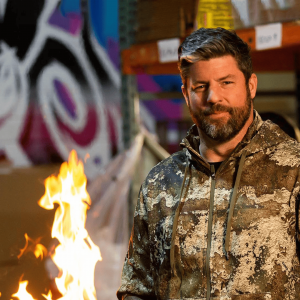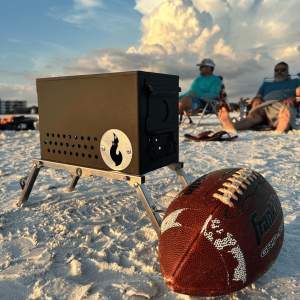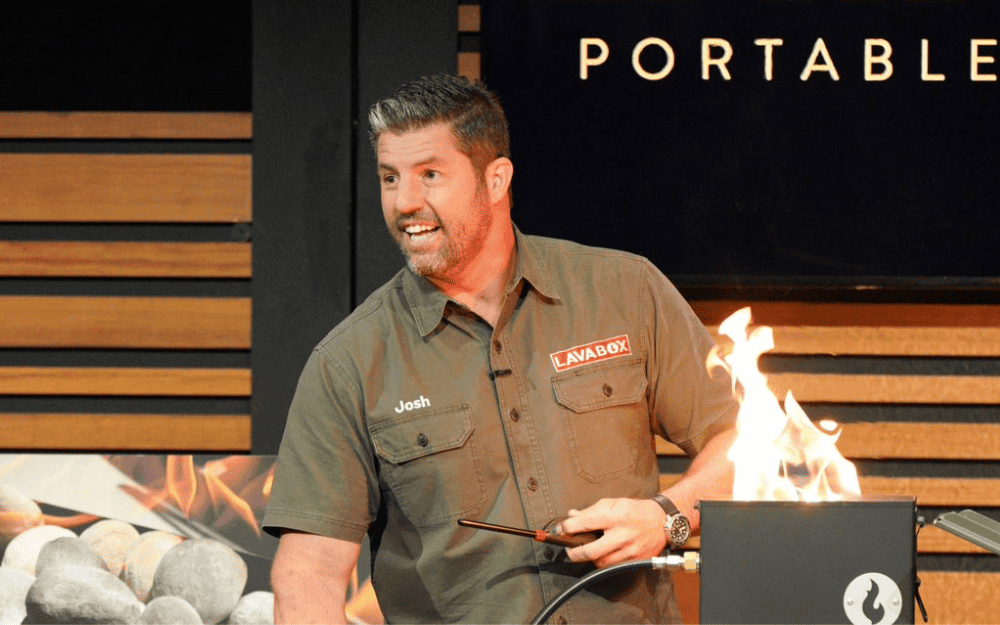A LavaBox is an innovative, extremely durable, portable fire pit which one can take on just about any adventure, whether it be off roading, camping, or even whitewater rafting. But, will the Sharks be ready to light a spark under this new way to take your firepit on the road? Read all about it in our LavaBox Shark Tank update.
What is LavaBox?
LavaBox is a company which manufactures portable fire pits using military-style ammo cans as their base. The Company is located in Denver, Colorado.
LavaBoxes are lightweight, very easy to set up and light, while at the same time, they are made with extremely durable components so that they are suitable for use by many outdoor enthusiasts, including kayakers, rafters, vanlifers, hunters, anglers, canoeists, skiers, snowboarders, motorcyclists, climbers, mountain bikers, and many others.
Who created LavaBox?

LavaBox was founded by Josh Thurmond, a Colorado native who has always been both an avid outdoorsman and an advocate for teaching sports to people with disabilities. Josh attended college at The Metropolitan State University of Denver, where he graduated with a BA in History, and then he went on to complete a Master of Public Administration degree at the University of Colorado at Denver.
Josh started his professional career in the Denver District Attorney’s Office, where he served as Technology Coordinator and Program Administrator. Josh also founded Oratist, a business dedicated to helping non-profit professionals and elected officials better express themselves and deliver their message in a more influential way. Prior to founding LavaBox, Josh also worked as the Metro Program Director of the National Sports Center for the Disabled, one of the largest outdoor therapeutic recreation and adaptive sports agencies in the world. Finally, Josh remains on the board of the Colorado Whitewater Association.
How did LavaBox get started?
Part of the origin story of LavaBox is related on the company website. During the forest fire season in the heart of the Rocky Mountains, LavaBox founder Josh Thurmond went out with a group of raft guides and kayakers who got together for one of the last trips of the year. And during this trip, while trying out an ungainly, portable backyard fire pit, someone joked about putting the behemoth on a raft.
Apparently, when some of the guides mentioned hauling a portable fire pit on a whitewater raft, everyone else laughed, but for Josh, it sparked an idea. He wondered, what if you could put a fire inside the most used piece of gear on the boat: the humble ammo can?
In general, Josh knew that whitewater rafting guides need the most rugged tools that they can get their hands on, so ammo cans often find their way onto rafts for this reason. They are so tough that you can even light them on fire without damaging them, so Josh decided to try putting a fire pit into an ammo can.
Josh had always enjoyed building things, so after this trip, he went home, and he worked on building prototypes for an ammo can fire pit. When he pitched in the Tank, Josh told the Sharks that he built 7 different versions, and the last one was the best, so he decided to make a few in his garage, and put them out on the market. When he had sold 40 LavaBoxes in a week, he knew that he had something worth pursuing.
What happened to LavaBox before Shark Tank?
When LavaBox founder Josh Thurmond pitched to the Sharks, the company had only been in business for about 18 months, but LavaBox was already on solid ground. Josh told RED, the newspaper of The Metropolitan State University of Denver, his alma mater, that the timing was good for LavaBox because as he was building the first prototypes, Colorado had recently imposed heavy restrictions on campfires due to the extreme wildfires which had burned in the state.
Josh told the college newspaper that LavaBox was the first restriction-proof fire pit to hit the market. He said this was no accident: “I went to patent literally days after finishing the final prototype.” When Josh pitched in the Tank, because of the boost from being first to market with a product which met the new campfire restrictions, the company already had sales of $610k year-to-date, and he was projecting sales of $1.2 million for the year. Also, the company had been profitable from almost the start of the venture.
As Josh appeared before the Sharks, rather than a simple cash investment, he was looking for mentorship and for help with breaking into the specialty retail market in stores like Bass Pro and Camping World.
What do customers think of LavaBox?

On the review site Judge.me, LavaBox has received 372 reviews, with an average rating of 4.92 out of 5 stars. LavaBox has achieved great ratings, as 352 out of 372 reviewers rate the product at a full 5 stars while only one reviewer gave the portable campfire a 1-star rating.
What are customers saying about LavaBox?
With so many 5-star reviews on Judge.me, there were a large number of very positive comments. One satisfied LavaBox buyer wrote, “Absolutely the best item I’ve purchased for camping and overlanding. I’ve used it more at home even, more so than our other gas fire pit. It sits low enough and flames are high enough so you can warm up your feet and legs along with the rest of you. Makes a huge difference when camping to make sure you’re warmed up before turning in. Can’t wait to do more!”
Another happy customer commented, “I bought two, one for my brother and one for me, and I couldn’t be happier. Not only does it work amazingly, it is sexy as hell. Can’t wait to bring it camping but already roasting marshmallows on it outside my garage. I wish there was a referral bonus because I’m going to be selling a ton of these just by using it in public lol. Thanks!”
One of the few critical comments we found for the LavaBox indicated that the customer didn’t believe that they had received good value for money. This reviewer said, “Cool idea, awesome compact setup. Ideal for overnight or minimalistic outdoor adventures. Price is remarkably high for an ammo container with a hole drilled in it, with commercial gas components. However, I’m happy to think of my purchase as an investment in the company and inventor for providing a great product. I paid for the stand and the travel bag, and I regret doing that. The stand is nice material, but designed so poorly.”
When did LavaBox appear on Shark Tank?
LavaBox appeared on Shark Tank in Season 14, Episode 18, which aired on March 31st, 2023. The company pitched to regular Sharks Mark Cuban, Lori Greiner, Kevin O’Leary, Daymond John, and recurring Guest Shark Daniel Lubetzky, founder and CEO of KIND Snacks.
Along with LavaBox, there were several adventure sports accessories which appeared on Season 14 of Shark Tank. For another innovative company with a focus on adventure sports, check out our FLATED Shark Tank update.
What happened to LavaBox on Shark Tank?
LavaBox founder Josh Thurmond entered the Tank and asked the Sharks for a $200k investment in return for a 10% equity stake in the company.
LavaBox creator Josh started his pitch by telling the Sharks that we all have some primal desires which we can’t control, and one of these is the desire to build fires, particularly campfires. He built on this theme by saying, “We all love a good campfire, but the devastation created by human-caused fires is heartbreaking, and oftentimes totally preventable.”
Josh next explained that he had created a portable fire pit that is easy to carry, easy to clean, and easy to use, and it keeps both people and the forest safe. He said that LavaBox is deceptively simple in that it is contained in a military-style ammo can, just pop the top, hook up the propane, and light it with a BBQ lighter. The LavaBox can also be equipped with legs to pass fire restrictions, and you can adjust it to have a small open fire to roast marshmallows, or a flame several feet high, for those camping trips when the temperature suddenly drops.
After Josh introduced the product, the Sharks were invited to look at samples of the smallest model, which they had in front of them.
The Sharks made a few general comments about the heavy-duty feel of the LavaBox, and Josh, in turn, told them that even though it is built with heavy-duty components, it was still the lightest portable fire pit on the market. Lori started the questions by asking how many sizes the company made, and she learned that there were three models of LavaBox, small, medium, and large.
Kevin O’Leary then wanted to know which size was the best seller, and what was its retail price. Josh told Mr. Wonderful that the smallest unit was the most popular, and it sold for $195, and it cost him about $29 landed.
Lori then asked Josh about himself, if he was a big camper, and he informed Lori that he had just left his job as the Program Director for the National Sports Center for the Disabled, and he had taught sports to people with disabilities for many years. He said that he had also made a lot of adaptive sports equipment for people over the years.
He then told Lori the story of being out with friends on a late-season camping trip, and they were trying to use a portable fire pit, which they all felt was too heavy to carry and too cumbersome, so he decided to go home and try to create something that would be easy to carry and could be used in any environment.
Finally, Josh told the Sharks that after this camping trip, he went home and got to work on building a prototype of a light, but heavy-duty, portable fire pit. He made 7 prototypes, and he thought that the last one was the best, so he built a few to offer for sale, and within a week, he had sold his first 40 units.
Mark Cuban was really complementary, and he told Josh that he was a great example for entrepreneurs of how to figure things out, make multiple versions, choose one, and then get it to market to see if it would sell.
After hearing Josh’s story, Kevin O’Leary asked him about sales, and he learned that the company had been in business for just 18 months, but that for the current year-to-date, they had $610k in revenues. Mark Cuban followed up and asked Josh if the company was profitable, and Mark learned that they were already profitable.
The Sharks next discovered that almost all of the LavaBox sales had been online, but Josh had spent very little on advertising. He said that everything had been word of mouth and that he had sold $100k worth of product at a single trade show.
With the numbers on the table, and the fact that the company was already profitable, at least one Shark now appeared ready to ignite the Tank with the first offer.
Did LavaBox get a deal on Shark Tank?
LavaBox successfully got a deal on Shark Tank. Lori Greiner agreed to invest $200k for a 12.5% equity stake in the company, along with a royalty of $.75 per unit until she recoups the $200k.
Kevin O’Leary started the negotiations by telling Josh, “I like it, it’s simple, easy to understand.” He then told Josh that if Chef Wonderful got behind it, “it’s going to the moon with a burger.” O’Leary then tendered the first offer of $200k for 20% of the company.
Daymond followed O’Leary and asked him what he needed from a Shark, and Josh told him that he’d like some help getting into retail, such as Bass Pro shops. He also told Daymond that much of the heavy lifting was done, but he’d like to have someone to call for advice and mentorship.
Daymond liked what he heard, and he thought that getting into some retail was a good idea, and he also believed that there were licensing opportunities, so he matched Chef Wonderful’s offer of $200k for 20%.
Lori spoke next, and she said that she didn’t think that LavaBox needed to be in a lot of retail, but it did make sense to work on Bass Pro Shops and Camping World. Taking a page from Mr. Wonderful’s playbook, she made an off of $200k for 15%, plus a royalty of $.75 until she recouped her investment.
Of course, O’Leary complained and tried to disparage a royalty deal as greedy, and he got a good laugh out of the rest of the Sharks. Josh then first went back to Lori to ask her if she would do it for 12%, with the royalty, and she said that she would do it for 12.5%
At this point, Daymond quickly jumped in to say that he would do it for 15%, with no royalty, and O’Leary followed this by saying, “I’ll make it more interesting, I’ll do the deal for $200k for 10%, no royalty, which was exactly what Josh had asked for in the Tank.
O’Leary chastised Lori again for the royalty deal, and then she said to Josh, “I trust my gut, and I go for things with conviction, I want to do 12.5%, but I hope you’re the person who knows in your gut if I’m the right person for you or not.” Josh then asked Lori if she’d cut the royalty to $.50, but she said, “Since $.75 is really low, I’m your girl.”
With three active offers on the table, Josh turned to Lori and said, “You’ve got a deal.”
LavaBox Shark Tank update, what happened next?
Like many other Shark Tank companies, LavaBox saw a huge increase in sales immediately following the airing of their episode, as they sold 260 units in a day after the episode aired, which is usually the number of units they would sell in a month.
Less than three weeks after the LavaBox Shark Tank episode aired, founder Josh Thurmond told Business Den that on the very day that his episode was broadcast on ABC, he decided not to sign the deal with Lori. He told the publication that “I did want it to work out, but it’s difficult to give up 12.5 percent of your company that you built; we’re not in dire straits on cash, so it was really about her leadership and mentorship.”
Even without a Shark on board the company has continued to grow, and founder Josh is currently trying to decide whether or not he wants to expand his company into a larger enterprise. He says that LavaBox brought in $1 million in revenue last year, and the company was on track to hit $2 million this year, but he’s not really sure how much he really wants to grow the company. With a profitable business and no debt, at this point, he only wants to take investors if it feels like a good fit.
Josh told Business Den, “This was a means to an end, this was a way to stop wildfires. It’s actually a more important question now, do I want to scale to a certain size? I really like the pace we’re at now.”
LavaBox seems to be a quite atypical Shark Tank story in that it is a company with a founder who had a clearly defined vision, and it appears that he feels he is achieving his goal, without the need to value growth over all of the other aspects of a business which he really enjoys.

